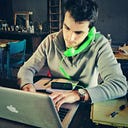Member-only story
One Man’s Quest to Infect People With Covid-19 for Science
Inside the movement to launch a human challenge trial for Covid-19
During Josh Morrison’s first year at Harvard Law School in 2007, while preparing for exams, he took a break from his studies and turned to the New York Times Magazine. That’s when he read an article that changed the trajectory of his life.
The author, a woman named Sally Satel, recounted her quest to find a kidney donor. Two numbers, in particular, grabbed his attention: In 2005 alone, 60,000 people were waiting for a new kidney. By 2007, the list had grown to 74,000. To Morrison, it amounted to a calling.
“The idea of needing an organ and worrying if anyone cared about you enough to do that — that seems like the loneliest, worst thing ever,” he says, relaying the tale in June while we peered at each other through our computer webcams.
Most people are born with two kidneys, the upshot of millions of years of evolutionary tinkering resulting in humans’ bilateral symmetry: two eyes, two ears, two nostrils. Our kidneys, though, are show-offs. A single kidney operating at three-quarter capacity can still filter bodily fluids, produce red blood cells, activate vitamin D, and perform its handful of other vital functions. Healthy people can survive just fine with one.

